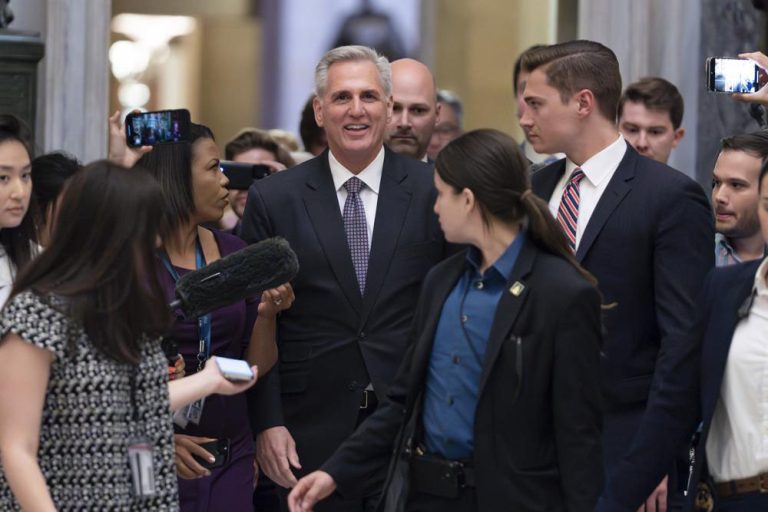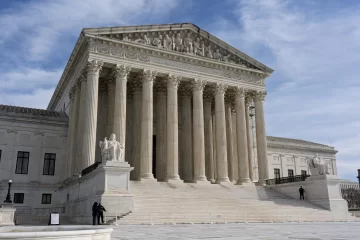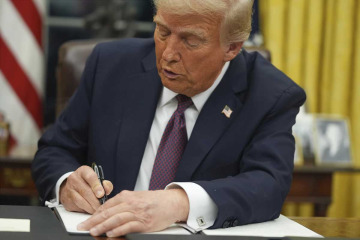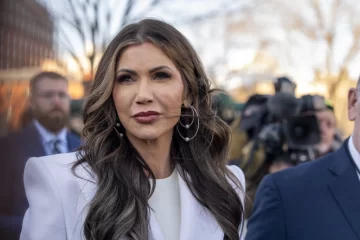Washington DC, August 16, 2023 — Congressional leaders are pitching a stopgap government funding package to avoid a federal shutdown after next month, acknowledging the House and Senate are nowhere near agreement on spending levels to keep federal operations running.
House Speaker Kevin McCarthy raised the idea of a months-long funding package, known as a continuing resolution, to House Republicans on a members-only call Monday evening, according to those familiar with the private session and granted anonymity to discuss it.
On Tuesday, Senate Majority Leader Chuck Schumer said the two leaders had spoken about such a temporary measure. It would extend federal funding operations into December to allow more time to work on the annual spending bills.
“I thought it was a good thing that he recognized that we need a CR,” Schumer, D-N.Y., told reporters on a call.
“We hope that our House Republicans will realize that any funding resolution has to be bipartisan or they will risk shutting down the government,” he said.
A stopgap measure that would keep government offices running past the Sept. 30 end of the fiscal year is a typical strategy while the Republican-held House and Democrat-held Senate try to iron out a long-term budget agreement. The government’s new fiscal year begins on Oct. 1, when funding approval is needed to avert closures of federal offices.
But this year, the task may prove more politically difficult. McCarthy will need to win over a large portion of his Republican colleagues to pass the stopgap bill or risk political blowback from staunch conservatives if he leaves them behind and cuts a bipartisan deal with Democrats.
Conservatives, including many from the House Freedom Caucus, are usually loathe to get behind short-term funding measures as they push for steeper spending cuts, using the threat of a shutdown as leverage.
Foretelling the political dynamics ahead, many in Congress are bracing for a shutdown.
“It’s clear President Biden and Speaker McCarthy want a government shutdown, so that’s what Congress will do after we return in September. Everyone should plan accordingly,” Republican Rep. Tony Gonzales posted on X, the platform formerly known as Twitter, shortly after the Monday Republican call.
Democrats alongside President Joe Biden don’t necessarily want a shutdown, but they would be quick to blame Republicans for instigating it — arguing that Republicans are the ones driving for spending reductions.
All sides had agreed to budget levels during the recent debt ceiling negotiations when Biden and McCarthy struck a deal that established topline spending levels. But McCarthy’s GOP majority rejects those amounts.
White House deputy press secretary Olivia Dalton was asked Tuesday on Air Force One if Biden is worried about a government shutdown.
“We worked in good faith to negotiate a bipartisan budget agreement a couple of months ago,” Dalton said.
“We’ve upheld our end of the bargain. They’ve upheld theirs, so far. We can expect that to continue.”
The White House had no immediate comment on whether Biden would sign a short-term resolution.
“We don’t believe that there’s any reason we should have to have a government shutdown, that congressional Republicans should bring us to that point,” Dalton said. “We think that we can work together to meet the needs of our country and the urgent needs that we’ve put forward.”
Along with deeper spending reductions, House Freedom Caucus members have also pushed to tie the government’s budget to conservative policy priorities on immigration and security at the U.S. border with Mexico, as well as at the Department of Justice.
Some Freedom Caucus members have embraced the idea of a government work stoppage to force lower spending, though many Republicans disagree with that approach.
Republican Rep. David Joyce, who sits on the Appropriations Committee and oversees its subcommittee on Homeland Security, said in a statement, “Republicans must come together to advance these bills because we cannot risk a government shutdown. When we shut down our government, we communicate to our adversaries that America is vulnerable and threaten the security of our nation.” – AP












